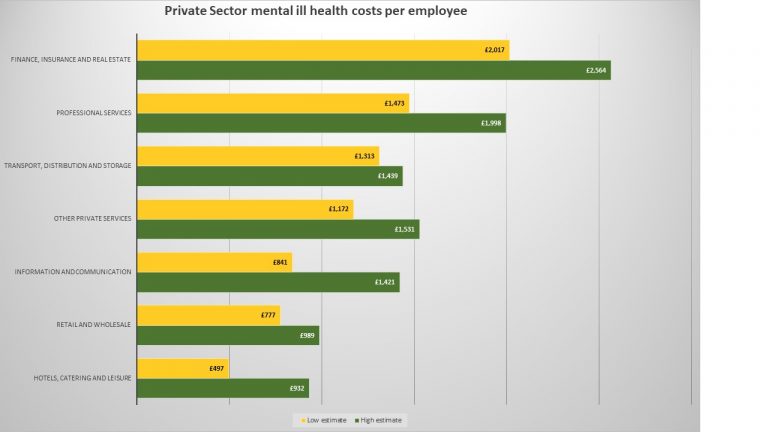Why Invest in Mental Health First Aid?
Employers – the responsibility is yours!
Of course, as an employer, you have a responsibility to the owners/shareholders of your company to protect and maximise profits. Keeping your staff mentally safe will form a key part of this strategy.
You also have a legal responsibility. In November 2018, the Health and Safety Executive amended their first aid needs assessment to include Mental Health First Aid.
FACTS
9% of employees who disclosed a mental health condition to their line managers reported being disciplined, demoted or dismissed.
Have a happier, more productive workforce
- Being happy at work has been shown to make employees care more about their company, are more mentally resilient, and are also physically healthier.
- Separate research by Oxford University’s Saïd Business School, and the University of Warwick have both found that workers are 12-13% more productive when happy.
- Analysis by Deloitte shows that for every £1 a business spends on supporting their people’s mental health, employers get £5 back on their investment.
Help your line managers support staff well-being
- 69% of UK line managers say that supporting employee wellbeing is a core skill.
- Only 13% of UK line managers have received any mental health training.
- 35% of line managers reported a wish for basic training in common mental health conditions.
- Human Resource managers also plays a key role in supporting well-being in the workplace, but research from the Mental Health Foundation showed that only 11% of those that needed it had received good support from their HR department.
Comply with your legal requirements
- Under the Health and Safety at Work etc Act 1974, employers have a duty of care to protect the health, safety and welfare of employees.
- Since November 2018, the Health and Safety Executive have amended their first aid needs assessment to include mental ill health.
- The Equality Act 2010 protects disabled people from unfair treatment. This includes many people with a mental health issue, someone is considered to have a disability if they have a physical or mental impairment that has a substantial, adverse, and long-term effect on their ability to carry out normal day-to-day activities.
Reduce your costs from absenteeism, presenteeism, and staff turnover
Figures from Mental Health First Aid England show that
- One in four people experience mental health issues each year.
- One in six workers will experience depression, anxiety or problems relating to stress at any one time.
- There were 602,000 cases of work-related stress, depression or anxiety in 2018/19 in Great Britain, responsible for 44% of all cases of work-related ill health and for 54% of all working days lost due to health issues.
Research by Benenden Health shows that:
- 42% of UK businesses have seen employees leave due to a lack of emotional support, with 25% saying they had lost a really valuable member of staff.
- 55% of workers (17 million UK employees) report they would seek a new job if their mental wellbeing was not being supported by their employer, increasing to 78% among 18-24 year olds.
The Stevenson / Farmer review of mental health and employers reported that
- In the UK, 72 million working days are lost every year, costing the economy over £42 billion. This equates to over £1,500 for every employee in the UK.
- Staff turnover costs UK businesses as much as staff absenteeism (£8 billion a year).
- Presenteeism (attending work even when not fully fit) accounts for more than three times as many losses as absenteeism (£26 billion a year).
1 in 4 affected by poor Mental Health
Statistics suggest that in the UK, mental health problems are the largest single source of disability (British Medical Association Board of Science, 2014), with approximately one in four people affected each year (McManus et al., 2009), costing the UK economy 4.5% of Gross Domestic Product (Davies, 2013). Also, The Health and Safety Executive (2017) state that:
Work-related stress is a major cause of occupational ill health which can cause severe physical and psychological conditions in your workers… health and safety legislation requires you to assess the level of risk from hazards in the workplace and to take all reasonably practicable measures to prevent or sufficiently reduce that risk.
For more details, see the latest HSE guidelines on First aid needs assessment, including Mental ill-health and first aid.

(Adapted from Farmer & Stevenson, 2017 – click on image for full-size view)
Mental Health annual cost to employers – as much as £42 billion
- Mental Health costs employers between £33 billion and £42 billion annually! This amounts to a cost per employee of between £1,205 and £1,560 per year. This cost is for all employees, not just those who are ill.
- The report set out “mental health core standards” – a framework for a set of actions which all organisations should be capable of implementing quickly. These mental health core standards are as follows:
- Produce, implement, and communicate a mental health at work plan
- Develop mental health awareness among employees
- Encourage open conversations about mental health and the support available when employees are struggling
- Provide employees with good working conditions and ensure they have a healthy work-life balance and opportunities for development
- Promote effective people management through line managers and supervisors
- Routinely monitor employee mental health and wellbeing
- In recent years, it has become increasingly clear that mental health problems can be addressed in the workplace. Initiatives to support mental health at work has grown noticeably – led by the rise in Mental Health First Aid training.
